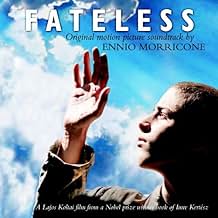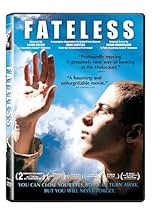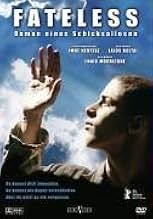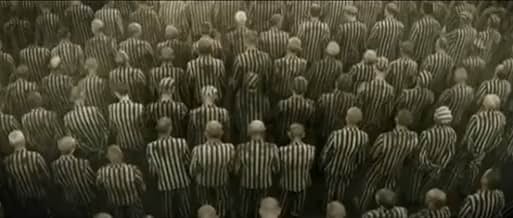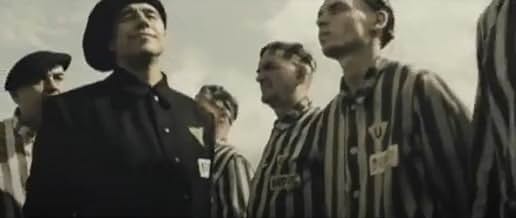Adicionar um enredo no seu idioma14-year-old György's life is torn apart in WWII Hungary, as he is deported first to Auschwitz and then to Buchenwald, where he is forced to become a man in the midst of hatred, and what it r... Ler tudo14-year-old György's life is torn apart in WWII Hungary, as he is deported first to Auschwitz and then to Buchenwald, where he is forced to become a man in the midst of hatred, and what it really means to be Jewish.14-year-old György's life is torn apart in WWII Hungary, as he is deported first to Auschwitz and then to Buchenwald, where he is forced to become a man in the midst of hatred, and what it really means to be Jewish.
- Prêmios
- 6 vitórias e 7 indicações no total
- Moskovics
- (as Dani Szabó)
Avaliações em destaque
An easy criticism of Fateless is that conditions of the camp are shown as persistently harrowing, but rarely explicitly violent. The hero Köves is starved, slapped and humiliated, but rarely does the viewer see an on-screen killing, even if the stench of the crematoria is omnipresent. So much is real horror left unseen in fact that at the close of the film, upon his return, there's a scene where Köves is quizzed about the existence of gas chambers by a doubtful citizen at his home station. As a confirmation it is surely unnecessary for the audience, as we've seen them earlier. One suspects that the importance of this brief exchange is instead to assert, once and for all, that Köves acknowledges the reality of the horror he's seen. Whether or not such epic tragedy, and his involvement in it, has enriched his humanity, a la Spielberg, is another matter entirely. By the end, Köves thinks back to his experience almost nostalgically, to the camps where "life was cleaner and simpler" and "where there's nothing too unimaginable to endure." As one might expect from an acclaimed cinematographer, much of Fateless looks superb. Whether its the snowflakes, like the millions of spirits already departed, floating inside the cattle trucks that speed the Hungarian Jews to their fate, or the field of camp mates, paraded mercilessly in the heat, and wavering in their distinctive striped uniforms, Koltai's eye creates haunting moments which remain with the viewer long after the closing credits. Arguably such poetry detracts from the grim reality of the camps in which a good deal of the film is set; but a good deal of the film is shot in muted colours, a blanched scheme, as if the warmth of life has bled out into genocide.
Performances are generally excellent, notably that of Nagy. Interviews on the disc show the young actor's nervousness at some of the more demanding scenes (and the increasing time required spent in make up as his on screen physical deterioration continues) but he plays a role which takes him from the dining room of the family home of Budapest to the death carts of Zief, without faltering. Fateless is an international co-production between Hungary, German and England. All three languages make their appearance, and so - incidentally - does the new James Bond, Daniel Craig, as Köves' liberation approaches. Here playing a concerned GI, who strongly suggests the boy seeks out a new life and a university place in the west, Craig makes a brief, if effective impression. As it turns out Köves' ultimate decision is characteristic of a film that favours reality over idealism.
But for those who seek the unrelenting grimness of camp life depicted as in, say, One Day In The Life of Ivan Denisovitch (1970), or the memorable depiction of the hardening of innocence into vengeful shock (Come And See), Fateless will doubtless prove a slight disappointment. Ennio Morricone's excellent score notwithstanding, which gives events here an occasionally pathetic sheen, this is a film which in many ways raises more issues and questions than it answers, and certainly offers no stereotypical picture of a ghastly time. Instead, by asking the audience to question preconceptions, it stakes claim to being one of the more important Holocaust dramas of our time.
Marcell Nagy is outstanding as Gyuri, the young man who moves from a childlike innocence to world-weariness in the span of one year. With his soulful face and expressive eyes, he is almost a detached observer, quietly pondering his fate. He is, in the Sufi saying, in the world, but not of it and the film unfolds as in a lucid dream that blurs the lines between appearance and reality. Koltai captures this almost matter-of-fact quality as Gyuri says goodbye to his father (Janos Ban) who has been ordered to work in a Nazi labor camp. Because Hungarians did not feel the full brunt of Nazi persecution until the Nazi takeover in 1944, Gyuri thinks his father is just going to have to work hard and that nothing will happen to him. Neighbors and relatives who reassure him that everything will be all right do not further his grasp of reality.
When the boy and his friends are detained on a bus on the way to work, he learns quickly that "his carefree childhood days are now over". Still not comprehending the magnitude of what is taking place, he is annoyed but not frightened and does not seize the opportunity to escape offered by a friendly cop. Even when he arrives at Auschwitz, he sits on the ground shaven and wearing a striped uniform, talking with friends as if he was in a school playground during recess. When Gyuri discovers that "he could be killed at any time, anywhere", he attains a sort of spiritual freedom and his determination to survive is increased. Pretending to be sixteen, Gyuri escapes the gas chamber and is sent to Buchenwald and then to a smaller camp.
The scenes of murder, death, and dying at the camps are thankfully left to the imagination and the film focuses on Gyuri's personal reactions to what he sees around him. Koltai, a cinematographer for twenty-five years, creates a visual cinematic poem in which his color palette is so muted that we experience the mud and the atmosphere of cold and gray almost viscerally. Sadly, we watch Gyuri's transformation from the confident teenager we saw at the beginning to an emaciated number, his leg so swollen and infected that he can barely walk. In voice-over, however, he talks about the hours between work and the evening meal as one of quiet reflection and about the joy in discovering a piece of meat or potato in his soup. He is also sustained by a friend he develops in fellow Hungarian Bandi Citrom (Aron Dimeny) who protects him and tries to teach him the skills of survival. Bandi, ever the optimist, proclaims, "I will walk down Nefelejcs Street again" One of the surprises in the film is the treatment Gyuri receives at what looks like a camp hospital.
He is cleaned, allowed to sleep alone in a bed and taken care of, a set of circumstances not usually associated with extermination camps, yet based on Kertesz' actual experience. The most discussed aspect of the film, however, takes place in Budapest after the liberation. Gyuri feels more alone than he did at Buchenwald and even expresses a sort of homesickness for the camaraderie he felt at the camp. Friends and neighbors who were not in the camps cannot understand what it was truly like and Gyuri cannot explain it. Even if he could, no one really wants to hear anything that rattles their preconceptions.
He rebels at playing the role of the victim and says, "there is nothing too unimaginable to endure". When asked about the atrocities, he talks of his happiness. "The next time I am asked", he says, "I ought to speak about that, the happiness of the concentration camp. If indeed I am asked. And provided I myself don't forget". His "happiness", according to Kertesz, who also wrote the screenplay, is not a form of denial but an act of rebellion against those who do not see him any longer as a human being, only as a victim. It was a way of assuring his responsibility, of defining his own fate rather than having others decide it for him. For me, it also added a portal into the sublime.
Marcel Nagy is spectacular, the director chose an amazing face and voice for the part, the character's attitude towards what's happening is shockingly mature and disaffected. He doesn't break down crying, or screaming , "why?!", he simply accepts that this has happened and tries to deal with it almost entirely inside his head. He is an introvert, speaking softly, and politely to those around him. He doesn't ask too many questions because he already thinks he knows all the answers. And these terrible answers are projected to the audience with the use of his powerful blue eyes, and his vital facial expressions (there are few scenes where the boy looks directly into the camera, and makes eye contact with you, the audience and I almost burst out crying..)
The look of the film was what made the rest so sublime, the grays and blues were so dis-enchantingly beautiful, as horrid in a way it is to call a Holocaust film beautiful, the effect is more of seeing what is inside the mind of an innocent; the dramatization of color desaturating could be considered the gradual removal of that innocence. The best way I could describe this is a 'dreamy nightmare', also so fitting an aesthetic, since a delirium sets in to those suffering, and those watching them suffer - it all becomes so heightened and insane; the men and women here are being stripped of the appreciation of beauty, but kindness among these prisoners remain, and that seems a unique aspect to this story. The fact is that Kertesz's memories include these acts of kindness, and camaraderie, rather than remembering back to it as something so completely horrendous, as as to be denying these victims the right to be human. But they are. In this film, there are no extreme acts of violence or mayhem (some minor, but no guns mowing down innocents like Schindler's List), just a quiet, reflective look at the human condition, and the innocent youth caught in the web of evil's banality.
I think the main problem people had with this film was they were expecting something... a little more dramatic, while this is a very quiet, very slow film that will appeal to those who work on those frequencies.
There are weaknesses too, of course, some dialogues, mainly in the beginning of the film are not natural (maybe it comes from Kertész's newness in film-writing), it' very disturbing as some weak acting in a few episodes. Marcell Nagy is not a bad choice for the leading role, he has the look and the power in his eyes but in speech he's not convincing, it drops you out of the atmosphere sometimes but it won't bother the not-Hungarian audience.
'Fateless' is an impressive European masterpiece, Hungary should be proud of it.
Você sabia?
- CuriosidadesThe production unexpectedly ran out of money halfway through and halted for several months in order to find new investors. This ended up working in its favor, since Marcell Nagy was going through puberty, and by the time they restarted, he looked physically more mature, taller, and his voice deeper. By the time his character enters and survives the death camp, he looks several years older than when the film began, adding an element of reality that otherwise would have been created with make-up.
- Citações
[last lines]
György Köves: [narrating] People only ask about the horrors, whereas I should talk about the happiness of the camps next time, if they ask. If they ask at all. And if I don't forget myself.
- Cenas durante ou pós-créditosFlash v. Schwabenland, Production Dog
- Trilhas sonorasHoldvilágos éjszakán (On a Moonlit Night)
Music by Mihály Eisemann
Lyrics by István Zágon
Sung by the four boys when the group is in transit
Principais escolhas
- How long is Fateless?Fornecido pela Alexa
Detalhes
- Data de lançamento
- Países de origem
- Centrais de atendimento oficiais
- Idiomas
- Também conhecido como
- Sem Destino
- Locações de filme
- Empresas de produção
- Consulte mais créditos da empresa na IMDbPro
Bilheteria
- Orçamento
- HUF 2.500.000.000 (estimativa)
- Faturamento bruto nos EUA e Canadá
- US$ 196.857
- Fim de semana de estreia nos EUA e Canadá
- US$ 12.680
- 8 de jan. de 2006
- Faturamento bruto mundial
- US$ 2.512.009
- Tempo de duração2 horas 20 minutos
- Cor
- Mixagem de som
- Proporção
- 2.35 : 1
Contribua para esta página






